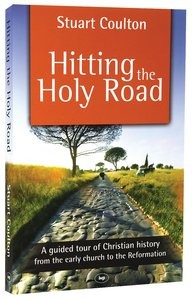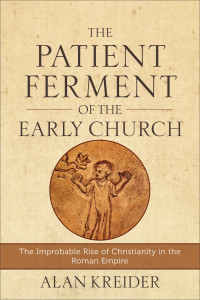Have you ever read a good church history book? I know, I know: many of us are not that fond of history. It can seem like all dates and names and so very foreign that it is hard to get into. At least, the history we remember from school seemed like that. But history is about real people and the drama of real life; it is often more incredible than anything you could make up.
So why read books on church history? Let me give you a couple of reasons:
- Church history shows us God’s working in the world. The true story of the growth and preservation of the church is nothing short of a miracle that reveals the grace of God.
- Knowing the past helps us understand the present. Church history traces why the church is the way it is today. If you want to understand why denominations exist, or why certain theological points are important, church history is a great place to go.
- There is nothing new under the sun. All of the challenges the church faces today have been faced before. The church has faced heresies, cultural opposition, government oppression, internal fractures and more. Knowing what has already happened will help us to avoid the same traps those before us fell into.
OK, with that in our minds, let me recommend a couple of church history books I have read recently.
Hitting the Holy Road, Stuart Coulton
If you have never read any church history before, this is a great place to start. It covers a long time period, from the early church to the Reformation. The writing is accessible to any Christian. I especially enjoyed the way this book has been structured. Each chapter deals with a specific period in church history, starting with a key place and what it looks like today. Then the history is recounted in a gripping way, pausing at key people and events along the way. And each chapter ends with some practical things modern Christians can take from this.
The author is clearly a believer who sees church history as relevant and gripping, and as the reader you will also feel the same way.
If you have had the privilege of travelling to Europe and seeing some of the places he mentions the photos and descriptions will give you an extra dimension and way to appreciate what has been done in the past.
This is a great book for Christians to read. If you have ever wondered how the Popes came to be powerful, or what the Reformation is, of why the Council of Nicea matters, I recommend this as a good place to start.
The Patient Ferment of the Early Church, Alan Kreider
This book is more specialized and would interest those who want to go deeper into the first three centuries of the church in particular. The author is concerned to show the factors that led to the incredible growth of Christianity among so many other religious alternatives and in the face of so much opposition. And some of what is said will surprise you.
Alan Kreider makes the point that after the apostles died the church didn’t appear to grow through public proclamation of the gospel as much as through personal witness and example. In the earliest of church teaching materials we have, there is a great deal said about living in a distinctive way while following Jesus, but little on evangelism. Churches did not encourage evangelism as a focus but lifestyle as what would attract pagans to the true faith. Some church leaders wrote public documents but admitted few in the pagan world read them or interacted with them. Yet the church grew.
Why? Of course we can answer that it is the work of God, which it is. But some of the key factors were that all were welcome in the church. You didn’t need to be rich or important, but slaves and free people, men and women were all welcome. This was a stark contrast to pagan worship where much was limited to men and to the aristocracy. Those interested in Christianity were trained and taught intensely for 3 years prior to baptism and morality was emphasized throughout, something not the case in the pagan world.
This is a tougher read, but contains some useful applications for our modern church as we enter an age of increased opposition to the people of God. Recommended.


